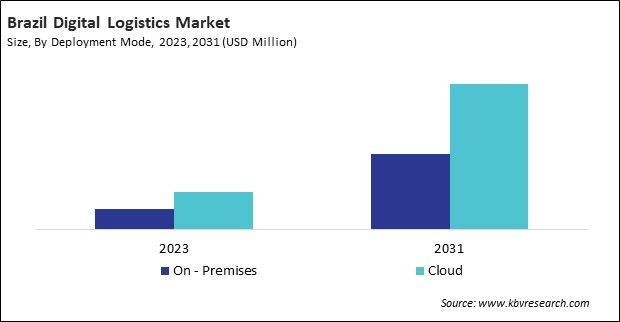
The Latin America, Middle East and Africa Digital Logistics Market would witness market growth of 19.8% CAGR during the forecast period (2024-2031).
The Brazil market dominated the LAMEA Digital Logistics Market by Country in 2023, and would continue to be a dominant market till 2031; thereby, achieving a market value of $1,890.5 million by 2031. The Argentina market is showcasing a CAGR of 20.5% during (2024 - 2031). Additionally, The UAE market would register a CAGR of 18.8% during (2024 - 2031).

Quantum computing is emerging as a powerful tool for solving complex logistics problems that traditional computing struggles with. Quantum algorithms can handle complex optimization problems related to routing, scheduling, and inventory management more efficiently than classical computers. Quantum computing aids in more accurate forecasting by quickly processing vast amounts of data, leading to better predictions and strategic planning.
Furthermore, digital twins are becoming increasingly important for creating virtual models of physical logistics operations. Digital twins allow businesses to simulate and test various scenarios in a virtual environment before implementing them, reducing risks and optimizing performance. They provide real-time insights into the status and performance of physical assets, helping to identify and address issues proactively.
Expanding renewable energy projects, such as solar farms and wind turbines, require the efficient delivery and installation of specialized equipment. These logistics solutions facilitate the coordination of these complex supply chains, ensuring timely delivery and installation of infrastructure components. According to information from the United Arab Emirates Embassy in Washington, Abu Dhabi has allocated over $20 billion towards renewable energy initiatives via Masdar. The rapid growth of e-commerce in Brazil drives the need for more fulfillment centers to handle increasing order volumes. These logistics solutions are essential for managing these centers efficiently, optimizing inventory, and streamlining order processing. Brazil's diverse geography and urban challenges, such as traffic congestion and remote areas, necessitate advanced digital logistics solutions for optimizing last-mile delivery. Solutions that provide route optimization, real-time tracking, and delivery scheduling are crucial for meeting customer expectations. Therefore, the increasing renewable energy and rising e-commerce sectors are propelling the market's growth.
Free Valuable Insights: The Worldwide Digital Logistics Market is Projected to reach USD 92.3 Billion by 2031, at a CAGR of 17.2%
Based on Deployment Mode, the market is segmented into On – Premises and Cloud. Based on Solutions, the market is segmented into Tracking & Monitoring, Data & Analytics, Fleet Management Systems, Electronic Data Interchange (EDI) Systems, and Others. Based on Application, the market is segmented into Transport Management, Warehouse Management, Labor Management, and Others. Based on End User, the market is segmented into Manufacturing, Retail & Consumer Goods, Healthcare, Energy & Utilities, Automotive, and Others. Based on countries, the market is segmented into Brazil, Argentina, UAE, Saudi Arabia, South Africa, Nigeria, and Rest of LAMEA.
By Deployment Mode
By Solutions
By Application
By End User
By Country
Our team of dedicated experts can provide you with attractive expansion opportunities for your business.
